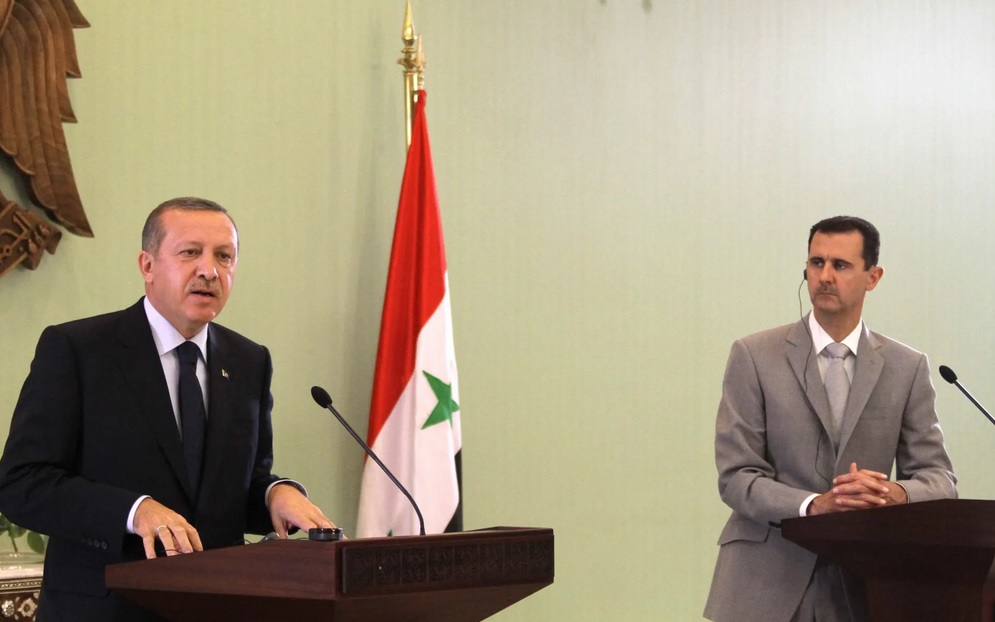The newspaper Asharq Al-Awsat focused, in a report, on the cold and indifferent stance of the Assad regime towards the accelerated Turkish rapprochement statements, including the offer to meet “Assad and Erdogan”. Sources from Damascus indicated that the regime believes the issue has not matured, reflecting Assad’s lack of enthusiasm to respond to this meeting.
The newspaper quoted sources in Damascus, stating that the Syrian-Turkish issue has not yet matured, despite Turkish statements over the past two days suggesting otherwise. The sources added that this issue is linked to other “thorny” issues, including the return of refugees, the relationship with the Kurdish Autonomous Administration, opposition factions, and foreign fighters in northern Syria. Progress in the Syrian-Turkish rapprochement requires both parties to make concessions to other involved parties or reach settlements ensuring regional stability, noting that “the land is still not ready” for this rapprochement.
She pointed out that the recent “flexible” Turkish statements towards Damascus were not welcomed by opponents in northern Syria, where mass demonstrations took place against the Turkish government’s stance. Damascus’s media outlets responded with “cold signals,” returning the issue to the demand for guarantees for the withdrawal of Turkish forces from Syrian territory.
The newspaper noted the absence of an official response from Damascus to the recent Turkish statements on Syrian-Turkish rapprochement, which suggested the imminent fruition of ongoing diplomacy on the Moscow-Ankara line with Arab efforts.
How the Syrian Regime Uses of Lebanese Businessmen to Circumvent Sanctions
In another report, the newspaper highlighted Turkish President Recep Tayyip Erdogan’s announcement of potentially inviting Bashar al-Assad to Turkey, raising questions about the possibility of holding the meeting in Ankara. Former Turkish diplomat Mohamed Oguçu suggested that the meeting between Erdogan and Assad might be held in Ankara in the presence of Putin. He noted that Syrian press close to the government in Damascus leaked that the meeting might take place in Baghdad, while Russian sources suggested it could be held in Moscow in September.
Oguçu stated that Ankara might see a meeting in Baghdad as a message that “the Arab world is behind Syria,” but believed Assad’s visit to Turkey was unlikely, given some Syrian territories are under Turkish control. He argued that the “Moscow option” is the best at this stage, with Putin able to influence Erdogan and having military bases in Syria. Putin’s intervention had previously saved Assad’s power.
Regarding Russia’s motivation to push normalization talks between Ankara and Damascus, Oguçu explained that Russian influence remains strong in Assad-controlled parts of Syria and that Putin and Assad want to counter “artificial” efforts by the United States, Britain, and the EU to achieve peace in Syria. Putin aims to resolve this issue through a common understanding between Iran, Syria, Russia, and Turkey, seeing himself as the most convincing mediator.
For Turkey, dynamics such as anger over Syrian refugees, security risks posed by the Democratic Union Party (PYD) and Kurdish People’s Protection Units (YPG) in northern Syria, and the burning of Turkish flags in areas controlled by Turkey-backed Syrian opposition groups are driving Ankara towards immediate peace. For Syria, in light of the Israeli threat, it seeks full sovereignty, the expulsion of foreign powers, and honourable peace with Turkey.
Turkey’s main priorities are ensuring the return of Syrian refugees and addressing the Autonomous administrative structure formed by the YPG and the PYD, highlighting the terrorist and security dimensions.
The Russian-mediated normalization of relations between Turkey and the Assad government could be seen as a counter-move against potential American actions post-November elections. The sudden opening of dialogue between Ankara and Damascus could be a “radical game-changer” in Syria. Civil actors in all liberated areas of Syria reject any form of rapprochement with the Assad regime, rejecting international dictates that undermine their movement and push towards reconciliation with the regime, which would legitimize the war criminal “Bashar” and align opposition forces with Turkey’s decisions, often against the popular will.
This article was translated and edited by The Syrian Observer. The Syrian Observer has not verified the content of this story. Responsibility for the information and views set out in this article lies entirely with the author.


